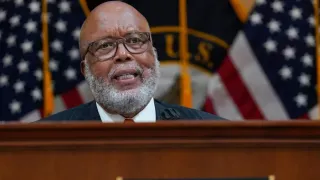December 4, 2024
Supreme Court Seems Likely to Uphold Tennessee's Ban on Medical Treatments for Transgender Minors
Mark Sherman READ TIME: 6 MIN.
Hearing a high-profile culture-war clash, the Supreme Court on Wednesday seemed likely to uphold Tennessee's ban on gender-affirming care for minors.
The justices' decision, not expected for several months, could affect similar laws enacted by another 25 states and a range of other efforts to regulate the lives of transgender people, including which sports competitions they can join and which bathrooms they can use.
The case is being weighed by a conservative-dominated court after a presidential election in which Donald Trump and his allies promised to roll back protections for transgender people, showcasing the uneasy intersection between law, politics and individual rights.
The Biden administration's top Supreme Court lawyer warned a decision favorable to Tennessee also could be used to justify nationwide restrictions on transgender healthcare for minors.
In arguments that lasted more than two hours, five of the six conservative justices voiced varying degrees of skepticism of arguments made by the administration and Chase Strangio, the ACLU lawyer for Tennessee families challenging the ban.
Chief Justice John Roberts, who voted in the majority in a 2020 case in favor of transgender rights, questioned whether judges, rather than lawmakers, should be weighing in on a question of regulating medical procedures, an area usually left to the states.
"The Constitution leaves that question to the people's representatives, rather than to nine people, none of whom is a doctor," Roberts said in an exchange with Strangio.
The court's three liberal justices seemed firmly on the side of the challengers. But it's not clear that any of the conservatives will go along.
Justice Sonia Sotomayor pushed back against the assertion that the democratic process would be the best way to address objections to the law. She cited a history of laws discriminating against others, noting that transgender people make up less than 1% of the U.S. population, according to studies. There are an estimated 1.3 million adults and 300,000 adolescents aged 13 to 17 who identify as transgender, according the UCLA law school's Williams Institute.
"Blacks were a much larger part of the population and it didn't protect them. It didn't protect women for whole centuries," Sotomayor said in an exchange with Tennessee Solicitor General Matt Rice.
Justice Ketanji Brown Jackson said she saw some troubling parallels between arguments made by Tennessee and those advanced by Virginia and rejected by a unanimous court, in the 1967 Loving decision that legalized interracial marriage nationwide.
Quoting from the 57-year-old decision, Jackson noted that Virginia argued then that "the scientific evidence is substantially in doubt and, consequently, the court should defer to the wisdom of the state legislature."
Justice Neil Gorsuch, who wrote the majority opinion in 2020, said nothing during the arguments.
The arguments produced some riveting moments. Justice Samuel Alito repeatedly pressed Strangio, the first openly transgender lawyer to argue at the nation's highest court, about whether transgender people should be legally designated as a group that's susceptible to discrimination.
Strangio answered that being transgender does fit that legal definition, though he acknowledged under Alito's questioning there are a small number of people who de-transition. "So it's not an immutable characteristic, is it?" Alito said.
Strangio did not retreat from his view, though he said the court did not have to decide the issue to resolve the case in his clients' favor.
There were dueling rallies outside the court in the hours before the arguments. Speeches and music filled the air on the sidewalk below the court's marble steps. Advocates of the ban bore signs like "Champion God's Design" and "Kids Health Matters," while the other side proclaimed "Fight like a Mother for Trans Rights" and "Freedom to be Ourselves."
Four years ago, the court ruled in favor of Aimee Stephens, who was fired by a Michigan funeral home after she informed its owner that she was a transgender woman. The court held that transgender people, as well as gay and lesbian people, are protected by a landmark federal civil rights law that prohibits sex discrimination in the workplace.






